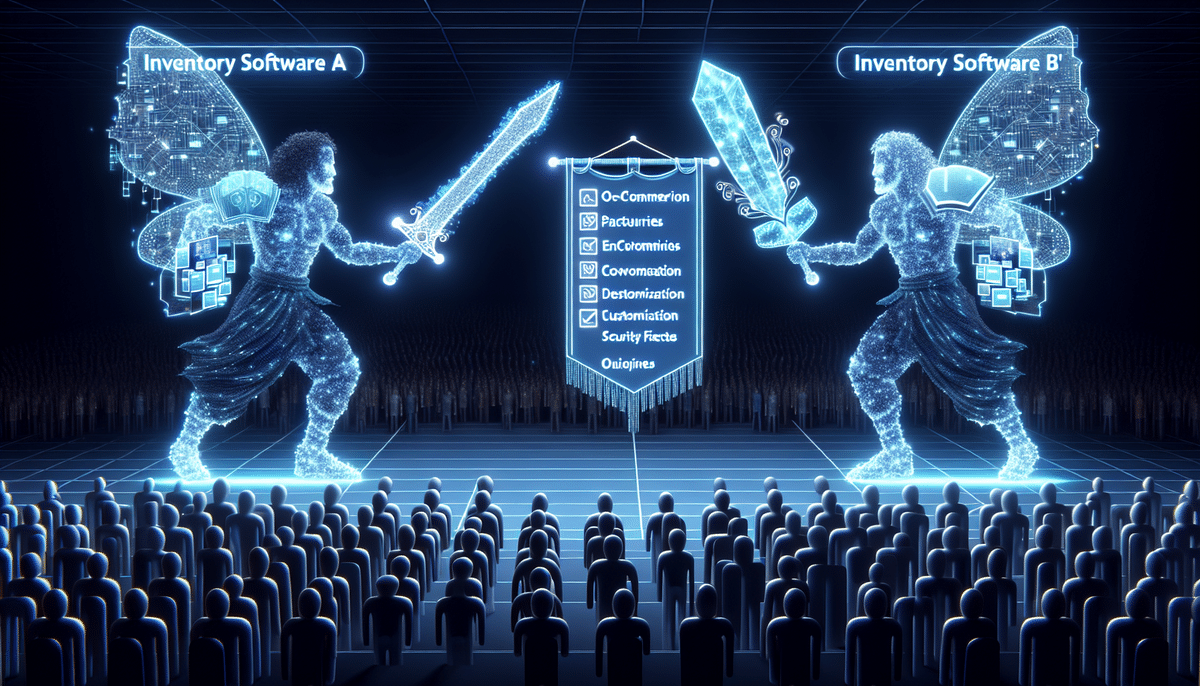Introduction to Inventory Management Software
Inventory management software is a critical tool for businesses of all sizes, enabling efficient tracking, organizing, and managing of inventory. It streamlines processes such as purchasing, storing, selling, and shipping products, thereby minimizing the risks of overstocking or understocking. Effective inventory management can lead to increased sales, reduced costs, and improved customer satisfaction.
As of 2023, the global inventory management market is projected to reach over $5 billion, driven by the increasing demand for automated solutions and real-time inventory tracking [1]. Choosing the right inventory management software can significantly impact a business's operational efficiency and profitability.
Key Features: Zoho Inventory vs DEAR Inventory
Zoho Inventory
- Inventory Tracking: Real-time tracking across multiple warehouses.
- Order Management: Comprehensive order processing from creation to fulfillment.
- Purchase Management: Automated purchase orders and vendor management.
- E-commerce Integration: Seamless integration with platforms like Shopify and Amazon.
- Advanced Reporting and Analytics: Detailed reports on sales trends, inventory levels, and more.
- Customizable Workflows and Automation: Automate repetitive tasks to enhance efficiency.
DEAR Inventory
- Warehouse Management: Advanced tools for managing multiple warehouses.
- Purchasing Management: Streamlined purchase order creation and supplier management.
- Order Management: End-to-end order tracking and fulfillment.
- Financial Management: Integration with accounting software like Xero and QuickBooks.
- Advanced Reporting and Analytics: In-depth analytics for forecasting and trend analysis.
- Customization Options: Highly customizable to fit specific business needs.
Benefits: Zoho Inventory vs DEAR Inventory
Zoho Inventory
- Streamlined Processes: Automates inventory management tasks, reducing manual effort.
- Multi-Channel Selling: Manage sales across platforms like Amazon, eBay, and Etsy from one dashboard.
- Real-Time Visibility: Access up-to-date inventory data to make informed decisions.
Businesses using Zoho Inventory have reported up to a 40% increase in operational efficiency due to automation and real-time tracking [2].
DEAR Inventory
- Advanced Customization: Tailor workflows and reports to specific business requirements.
- Robust Security: Enhanced security features to protect sensitive data.
- Batch and Expiry Tracking: Ideal for businesses dealing with perishable goods.
DEAR Inventory users have experienced a 30% reduction in inventory discrepancies through its advanced tracking and security features [3].
Pricing and Plans Comparison
Zoho Inventory
Zoho Inventory offers four pricing tiers:
- Free: Up to 20 online orders and 20 offline orders per month.
- Basic: Starting at $49/month for increased order and warehouse limits.
- Standard: Starting at $99/month with advanced features like multi-channel selling.
- Professional: Up to $249/month for high-volume businesses with extensive needs.
DEAR Inventory
DEAR Inventory provides three pricing plans:
- Small: Starting at $249/month for growing businesses.
- Standard: $399/month with additional features and integrations.
- Pro: $599/month for large enterprises requiring comprehensive management tools.
Both platforms offer free trials, allowing businesses to evaluate the software before committing. Additionally, Zoho Inventory includes a mobile app, enhancing accessibility, whereas DEAR Inventory does not currently offer a dedicated mobile application.
Usability, Integration, and Security
User-Friendliness
Zoho Inventory is renowned for its intuitive interface, making it accessible for users with minimal technical expertise. In contrast, DEAR Inventory offers a more complex interface with extensive customization options, which may require a steeper learning curve.
Integration Capabilities
Zoho Inventory integrates seamlessly with a broad range of platforms, including Zoho CRM, Zoho Books, Shopify, and Amazon. This extensive integration ecosystem facilitates a unified business operation. DEAR Inventory also integrates with major e-commerce platforms like Shopify and WooCommerce, as well as accounting software like Xero and QuickBooks, but it lacks the breadth of integrations available within the Zoho suite.
Security Features
Both software solutions prioritize security with features like user authentication and data encryption. However, DEAR Inventory enhances security with two-factor authentication, IP-blocking, and role-based access control, providing an extra layer of protection for sensitive business data.
Reporting and Analytics
Both Zoho Inventory and DEAR Inventory offer robust reporting and analytics tools. Zoho Inventory provides customizable reports that allow businesses to tailor insights according to their specific needs. This flexibility enables detailed analysis of sales trends, inventory turnover, and more.
DEAR Inventory excels in advanced analytics, offering forecasting and trend analysis to help businesses anticipate inventory needs and optimize stock levels. These features support strategic decision-making and long-term planning.
According to a Business News Daily report, businesses utilizing advanced analytics in inventory management report a 25% improvement in inventory accuracy and a 20% reduction in holding costs.
Case Studies: How Businesses Have Benefited
Numerous businesses have experienced significant improvements by implementing Zoho Inventory and DEAR Inventory:
- Retailer A: Achieved a 50% increase in efficiency by switching to Zoho Inventory, thanks to its automation and multi-channel integration capabilities.
- Manufacturer B: Utilized DEAR Inventory to manage inventory across multiple locations, resulting in a 30% increase in sales and a 15% higher profit margin.
- eCommerce Store C: Leveraged Zoho Inventory’s real-time tracking to reduce stockouts by 40% and improve customer satisfaction.
Final Verdict: Choosing the Right Inventory Management Software for Your Business
The decision between Zoho Inventory and DEAR Inventory hinges on your business's specific needs:
- Choose Zoho Inventory if:
- You require an intuitive interface with minimal technical setup.
- Seamless integration with a wide range of e-commerce platforms and Zoho's suite of business applications is essential.
- Access to a mobile app for on-the-go inventory management is important.
- Choose DEAR Inventory if:
- Your business demands advanced customization and robust security features.
- Integration with accounting software like Xero and QuickBooks is a priority.
- You manage inventory across multiple warehouses or handle perishable goods requiring batch and expiry tracking.
Ultimately, evaluating your business’s unique requirements and leveraging free trials can help determine which inventory management solution aligns best with your strategic objectives.






















